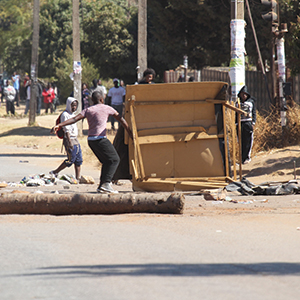Zimbabwe’s economic crisis has created a new opportunity for humanitarian aid agencies to insist on good governance, a Caritas spokesman has said, as the country turns to the West amid reports that Harare’s relations with China are going sour.
This follows President Robert Mugabe’s announcement earlier this year that Chinese companies would no longer control the Marange diamond field after he accused them of “swindling” and looting diamonds. It has also been reported that government revenues have missed out on up to US$15 billion from the mines. Critics maintain the Government and the Army are equally complicit in the looting of Marange.
Diamonds were discovered in the area in 2006 and two years later, in 2008, five companies – the government-owned Marange Resources, two Chinese companies, a South African firm and a Lebanese-run group – were given mining licences. Since then, there have been widespread reports of atrocities and other human rights violations by soldiers, police and security guards manning the vast fields. Villagers in the region have also been displaced and are facing food shortages, after claiming that local water sources are polluted.
The Beijing-Harare clash was not unexpected. According to the International Institute for Strategic Studies (IISS), a global security, political risk and military conflict think tank, the limits of Mugabe’s “Look East” policy were clear by 2014, when his attempt to raise US$27 billion for an economic recovery programme produced little more than a non-specific verbal agreement of support from China.
In an interview on Friday last week, Caritas Zimbabwe coordinator Christopher Mweembe said now was the time for development agencies in the country to embark on a rights-based approach to humanitarian aid. “We must hammer in on the issues of rule of law and good governance,” he told The Tablet.
He also warned that the number of people needing food aid is growing because of the current devastating drought, adding that Caritas’ relief funds are insufficient to meet needs. According to government figures, more than 4.5 million people in a population of just over 14 million are “food insecure”. “At Caritas we launched a US$1.5 million emergency appeal on 2 May this year but we have managed to raise only US$650,000. We are appealing for more,” Mr Mweembe said.
Caritas Zimbabwe is implementing a drought response programme through diocesan structures in various provinces. More than 22,700 people are benefiting directly, with activities including school feeding, unconditional cash transfers and cash for work. But Mr Mweembe pointed out that the political environment was unstable, and a recent national “stayaway” strike had seen arbitrary arrests of human rights activists. The 6 July protest was against bad governance and high-level corruption.
Elsewhere, Malawi’s Episcopal Conference has appealed for humanitarian aid for over six million Malawians at risk of severe hunger. “Our hospitals are already reporting higher rates of malnutrition cases with the situation feared to worsen as we approach what we normally call the lean period,” the bishops said in a statement signed by Archbishop Thomas Msusa of Blantyre.
14 July 2016, The Tablet
Relief agencies ‘can demand good governance’
 Loading ...
Loading ...
Get Instant Access
Subscribe to The Tablet for just £7.99
Subscribe today to take advantage of our introductory offers and enjoy 30 days' access for just £7.99



